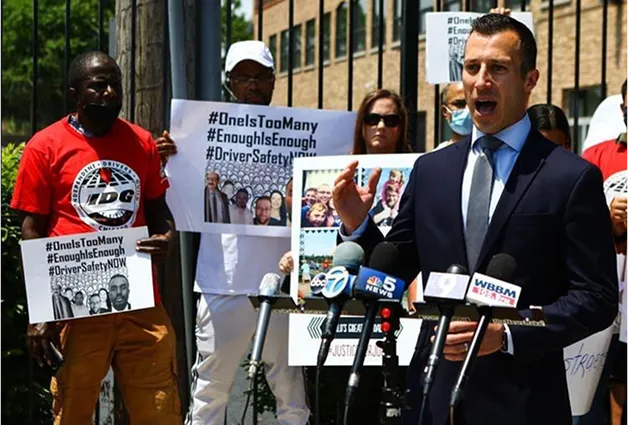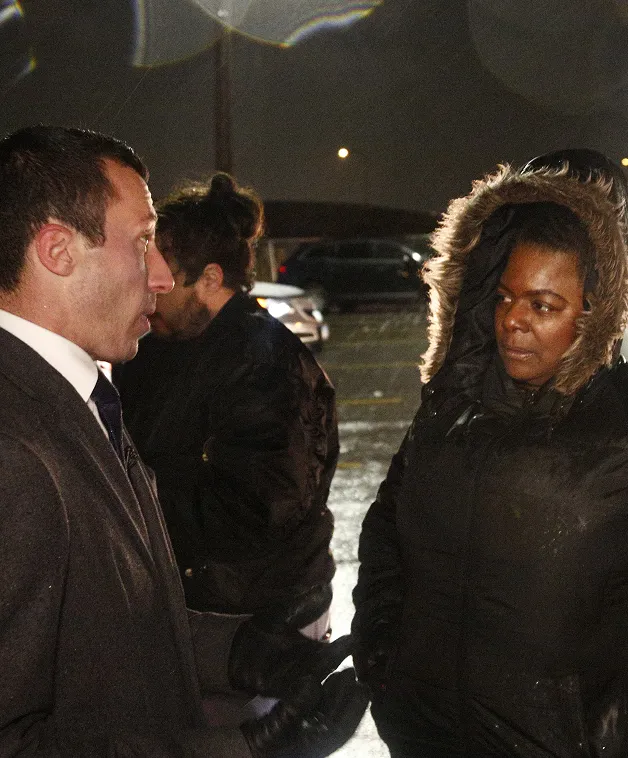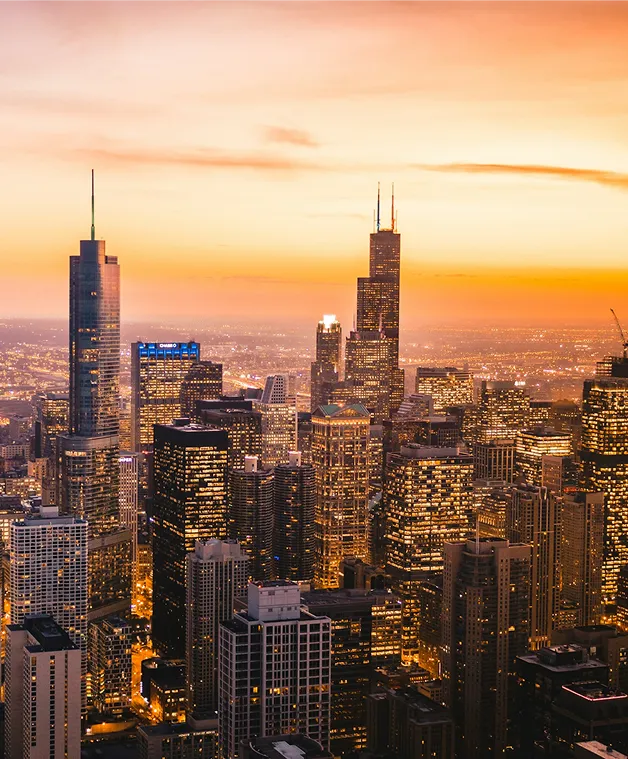





If you were hurt by an Uber or Lyft accident in the Chicago area, don’t wait for help.
Who is Liable in a Rideshare Accident?
When the Rideshare Driver Is at Fault
Uber and Lyft drivers must follow traffic laws like any other motorist. You can hold them responsible if a driver causes a crash due to speeding, distracted driving, failing to yield, or another violation. However, the rideshare company’s insurance policy may provide coverage depending on the driver’s status during the crash.
- The Driver was offline. The driver’s auto insurance applies.
- The driver was waiting for a ride request. Uber and Lyft provide limited liability coverage.
- The Driver had an active ride or was en route to pick up a passenger. The rideshare company’s full coverage applies.
When Another Driver is at Fault
If another driver causes a crash, their insurance should cover the damages; however, if they are uninsured or underinsured, Uber and Lyft provide additional coverage for passengers and drivers under certain conditions.
When You Can Hold Uber or Lyft Responsible
Although rideshare companies classify drivers as independent contractors, there are situations in which the company itself could be held accountable. If a driver with a known history of reckless behavior is allowed to continue driving, Uber or Lyft may share responsibility.
Determining liability requires a detailed review of the accident. If you were injured in a rideshare crash, contact us for a free consultation. An experienced Uber and Lyft accident attorney in our Chicago office will examine the details of your case and explain your options for pursuing compensation.
What Compensation Can You Recover After a Rideshare Accident?
A rideshare accident can lead to medical bills, time away from work, and other unexpected costs. If someone else is responsible for the crash, you may be able to recover compensation for these losses. The amount you can receive depends on the severity of your injuries, the impact on your daily life, and the insurance policies involved.
Medical Expenses
Treatment costs can add up quickly after a rideshare accident.
Compensation may cover:
- Emergency room visits and hospital stays
- Surgeries and medical procedures
- Rehabilitation and physical therapy
- Prescription medications
- Future medical care for long-term injuries
Lost Income and Reduced Earning Capacity
If your injuries prevent you from working, you may recover lost wages. Compensation can also cover reduced earning potential if the accident prevents you from returning to the same job.
Pain and Suffering
Not all losses are financial. Injuries from a rideshare accident can affect your daily activities, mobility, and emotional well-being. While these damages do not have a fixed dollar amount, they are often included in claims.
Property Damage
If your personal property was damaged in the accident, you may be entitled to compensation for repairs or replacement costs.
How to Determine Compensation
The total amount depends on the severity of injuries, medical costs, and the available insurance coverage. Insurance companies often try to settle claims quickly for less than their full value. Speaking with a rideshare accident attorney can help you seek the full amount you owe.
Schedule A Free Consultation

"LegalRideshare focuses on accidents and injuries. We help drivers who have been in car accidents who need help with their insurance claims, whether it's for medical bills, lost wages, pain and suffering, anything that relates to being physically injured in a car accident. Our focus is on drivers; we also help passengers. If you've been injured in a rideshare-related event, even as a pedestrian crossing the road, if an Uber car hits you, anything that relates to the rideshare space where there's a bodily injury that requires medical treatment, that's where we step in and can demand compensation."
Attorney Bryant Greening, LegalRideshare Co-Founder
Six Steps to File a Claim After a Rideshare Accident
Filing a claim after a rideshare accident involves several steps. Uber and Lyft have insurance policies, but recovering compensation can be challenging. Knowing what to do after an accident can help protect your rights and strengthen your claim.
Step 1: Report the Accident
- Contact law enforcement to create an official report. This document can serve as evidence when filing a claim.
- Notify Uber or Lyft through their app. Both companies require drivers and passengers to report accidents, which starts the claims process.
Step 2: Seek Medical Attention
Even if injuries seem minor, a medical evaluation immediately after the accident can identify underlying issues that may worsen over time. Medical records also serve as key evidence in an injury claim.
Step 3: Gather Evidence
The more information you collect, the stronger your claim.
Useful evidence includes:
- Photos or videos of the accident scene, vehicle damage, and visible injuries.
- A copy of the police report.
- Contact details of any witnesses.
- Insurance and rideshare trip details.
Step 4: Notify the Insurance Companies
Depending on who caused the crash, different insurance policies may apply:
- If another driver caused the accident, their auto insurance should cover the damages.
- If the rideshare driver was at fault, Uber or Lyft’s insurance policy may apply based on the driver’s status at the time of the crash.
- If the at-fault driver was uninsured, Uber and Lyft provide uninsured/underinsured motorist coverage in certain situations.
Step 5: Avoid Quick Settlement Offers
Insurance companies often try to settle cases quickly, offering low amounts that may not fully cover medical bills and other losses. Once a settlement is accepted, you cannot request additional compensation later.
Step 6: Get Legal Help
Our Chicago rideshare accident attorneys can handle negotiations with insurance companies, review settlement offers, and take legal action if necessary. This ensures you are not pressured into accepting less than you deserve.

Why You Shouldn’t Accept Uber or Lyft’s Initial Settlement Offer
If an Uber or Lyft accident injured you, contact us for a free consultation to discuss your claim by calling 312-815-1859
After a rideshare accident, insurance companies may contact you with a settlement offer. While accepting money quickly might seem helpful, these initial offers are often much lower than the claim's worth.
Why Insurance Companies Offer Low Settlements
Uber and Lyft's insurance providers are businesses. Their goal is to settle claims for the lowest amount possible.
Some of the tactics they use include:
- Offering a fast payout before medical bills or long-term injuries are fully assessed.
- Downplaying the severity of injuries.
- Blaming another driver or outside factors to reduce their responsibility.
Once a settlement is accepted, you cannot request additional compensation later, even if new medical issues arise.
Frequently asked questions
Rideshare Accidents FAQ
Why Hire a Rideshare Accident Lawyer?
Hiring a rideshare accident lawyer can increase your chances of receiving the full compensation you deserve. While it is possible to handle your claim on your own, working with a lawyer provides several advantages that can make a significant difference in the outcome of your case.
Insurance Companies Have Teams of Lawyers
When you file a claim, insurance companies have their legal teams working on their behalf. These teams work to protect the company’s interests, which can result in an unfair settlement amount. Our rideshare accident lawyers are focused on protecting your rights and ensuring you receive a fair outcome.
Investigation and Evidence Collection
An attorney can help gather critical evidence that may not be immediately obvious.
This includes obtaining:
- Police reports, photos, and video footage.
- Statements from witnesses.
- Medical records that prove the full extent of your injuries.
The more evidence you have, the stronger your case will be. Our team can build a compelling claim with all the necessary details.
Handling Legal Procedures and Negotiations
Rideshare accident claims often involve complex legal procedures. Dedicated accident lawyers can manage every aspect of the process, from filing the claim to negotiating with insurance companies. We will ensure all deadlines are met, and your claim is submitted correctly.
Moreover, insurance adjusters are trained to ask questions that can lead you to say things that might hurt your claim. They may try to downplay your injuries, shift blame, or use your own words to justify a lower payout. When a lawyer handles these conversations for you, there is less risk of saying something that could be misinterpreted or used against you.
Beyond protecting your claim, having an attorney represent you also alleviates stress. Rather than facing constant calls, confusing policy language, and pressure to settle quickly, you can concentrate on your recovery while your lawyer advocates for the compensation you deserve.
advocates for the compensation you deserve.
Litigation if Necessary
If an insurance company does not offer a fair settlement, your rideshare attorney can file a lawsuit and represent you in court, which gives you a better chance of securing a favorable verdict and maximum monetary compensation.
Common Injuries in Chicago Rideshare Accidents
Rideshare accidents can cause many injuries, from minor bruises to long-term medical conditions. The severity of an injury often depends on the impact of the crash, whether seat belts were used, and the individual's position inside the vehicle.
Frequent Injuries from Rideshare Crashes
- Whiplash and Soft Tissue Injuries – Sudden stops or impacts can strain muscles, ligaments, and tendons, leading to pain and stiffness.
- Head and Brain Injuries – Concussions and traumatic brain injuries (TBI) may occur even without direct head impact. Symptoms like dizziness, headaches, and memory issues should be taken seriously.
- Broken Bones – Arms, legs, ribs, and facial bones are vulnerable to high-impact collisions. Some fractures require surgery and long recovery periods.
- Spinal Cord Injuries – Damage to the spine can lead to chronic pain, reduced mobility, or, in severe cases, paralysis.
- Internal Injuries – Blunt force trauma can cause organ damage or internal bleeding, which may not be immediately noticeable but can be life-threatening.
Long-Term Effects of Rideshare Injuries
Even injuries that seem minor at first can lead to long-term medical needs. Some injuries worsen over time, requiring ongoing treatment such as physical therapy, medication, or surgery. Emotional distress, including anxiety or post-traumatic stress, is also common after a serious accident.
How Long Do You Have to File a Rideshare Accident Claim?
Rideshare accident claims must be filed within a specific time frame, known as the statute of limitations. This deadline varies by state but generally ranges from one to four years from the date of the accident. You may lose the right to seek compensation if a claim is not filed within this period.
Factors That Affect Filing Deadlines
- State Laws—Each state has its rules for personal injury and insurance claims. Illinois has a two-year deadline for filing personal injury lawsuits.
- Claims Involving Government Vehicles – If a rideshare accident involves a city bus or another government-owned vehicle, the deadline may be much shorter, often requiring action within a few months.
- Minors and Incapacitated Individuals – If the injured person is under 18 or physically unable to file a claim, some states allow extensions until the individual can legally act.
Why Acting Quickly After an Uber or Lyft Accident Matters
The sooner a claim is filed, the easier it is to collect evidence, locate witnesses, and obtain records from insurance companies. Waiting too long may make proving liability harder or securing fair compensation.
Get Help Before Time Runs Out
Determining the correct deadline for your case can be complicated. If you were injured in a rideshare accident, reach out today for a free consultation. We can review your situation and help ensure you meet all legal deadlines.
Why You Shouldn’t Accept Uber or Lyft’s Initial Settlement Offer
After a rideshare accident, insurance companies may contact you with a settlement offer. While accepting money quickly might seem helpful, these initial offers are often much lower than the claim's worth.
Why Insurance Companies Offer Low Settlements
Uber and Lyft's insurance providers are businesses. Their goal is to settle claims for the lowest amount possible.
Some of the tactics they use include:
- Offering a fast payout before medical bills or long-term injuries are fully assessed.
- Downplaying the severity of injuries.
- Blaming another driver or outside factors to reduce their responsibility.
Once a settlement is accepted, you cannot request additional compensation later, even if new medical issues arise.
What You May Lose by Accepting Too Soon
A quick settlement might not cover the following.
- Ongoing medical treatments, such as physical therapy or surgeries.
- Lost income if you are unable to work for an extended period.
- Past and future pain and suffering are often undervalued in early offers.
Insurance companies know that injured individuals may feel financial pressure after an accident. They use this to their advantage by making reasonable offers but failing to account for long-term losses.
How to Ensure a Fair Settlement
Before accepting any money from an insurance company, it is important to:
- Review all medical records and treatment plans.
- Calculate the total financial impact of the accident, including lost income.
- Consider how injuries may affect your ability to work or perform daily activities.
If you receive a settlement offer, have it reviewed by a skilled rideshare injury attorney on our Chicago team before making a decision. Contact us for your free consultation to discuss whether the offer reflects the actual value of your claim.
What Compensation Can You Recover After a Rideshare Accident?
A rideshare accident can lead to medical bills, time away from work, and other unexpected costs. If someone else is responsible for the crash, you may be able to recover compensation for these losses. The amount you can receive depends on the severity of your injuries, the impact on your daily life, and the insurance policies involved.
Medical Expenses
Treatment costs can add up quickly after a rideshare accident.
Compensation may cover:
- Emergency room visits and hospital stays
- Surgeries and medical procedures
- Rehabilitation and physical therapy
- Prescription medications
- Future medical care for long-term injuries
Lost Income and Reduced Earning Capacity
If your injuries prevent you from working, you may recover lost wages. Compensation can also cover reduced earning potential if the accident prevents you from returning to the same job.
Pain and Suffering
Not all losses are financial. Injuries from a rideshare accident can affect your daily activities, mobility, and emotional well-being. While these damages do not have a fixed dollar amount, they are often included in claims.
Property Damage
If your personal property was damaged in the accident, you may be entitled to compensation for repairs or replacement costs.
How to Determine Compensation
The total amount depends on the severity of injuries, medical costs, and the available insurance coverage. Insurance companies often try to settle claims quickly for less than their full value. Speaking with a rideshare accident attorney can help you seek the full amount you owe.
Who is Liable in a Rideshare Accident?
Liability in a rideshare accident depends on how the crash happened and who it involved. Several parties, including the rideshare driver, another motorist, or the company’s insurance provider, may be responsible.
When the Rideshare Driver Is at Fault
Uber and Lyft drivers must follow traffic laws like any other motorist. You can hold them responsible if a driver causes a crash due to speeding, distracted driving, failing to yield, or another violation. However, the rideshare company’s insurance policy may provide coverage depending on the driver’s status during the crash.
- The Driver was offline. The driver’s auto insurance applies.
- The driver was waiting for a ride request. Uber and Lyft provide limited liability coverage.
- The Driver had an active ride or was en route to pick up a passenger. The rideshare company’s full coverage applies.
When Another Driver is at Fault
If another driver causes a crash, their insurance should cover the damages; however, if they are uninsured or underinsured, Uber and Lyft provide additional coverage for passengers and drivers under certain conditions.
When You Can Hold Uber or Lyft Responsible
Although rideshare companies classify drivers as independent contractors, there are situations in which the company itself could be held accountable. If a driver with a known history of reckless behavior is allowed to continue driving, Uber or Lyft may share responsibility.
Determining liability requires a detailed review of the accident. If you were injured in a rideshare crash, contact us for a free consultation. An experienced Uber and Lyft accident attorney in our Chicago office will examine the details of your case and explain your options for pursuing compensation.
Get Help Before Time Runs Out
Contact a Chicago Rideshare Attorney at LegalRideshare Lawyers Today
LegalRideshare was launched nearly a decade ago as the first law firm dedicated to Uber, Lyft, delivery, and gig work accident cases.
Before LegalRideshare, many injured drivers and passengers struggled to understand how rideshare insurance worked or what legal options were available. We founded this firm to ensure that gig workers and accident victims have an advocate who knows the unique challenges of these cases.
Since then, LegalRideshare has focused solely on gig economy accident and injury claims. We have represented thousands of clients and secured millions of dollars for drivers, passengers, and others hurt in rideshare and delivery-related crashes. Whether handling a complicated insurance claim or taking legal action against a company that refuses to pay, we fight for the compensation our clients need and deserve.
If you were injured in an Uber, Lyft, or delivery accident in the Chicago area, you don’t have to handle the legal process alone. We know how rideshare and delivery insurance policies work, and we fight to get our clients the compensation they deserve.
Whether you need help dealing with an insurance claim, negotiating a settlement, or taking legal action, we are ready to assist. We handle the legal work so you can focus on recovery.











